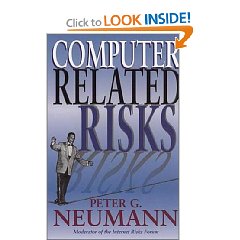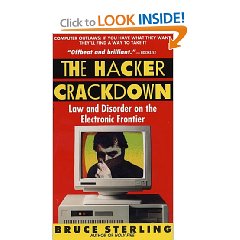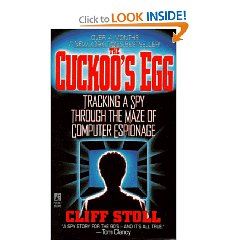Review: Masters of Deception–The Gang That Ruled Cyberspace
4 Star, Asymmetric, Cyber, Hacking, Odd War, Information Society, Information TechnologyReview: The Hacker Crackdown–Law And Disorder On The Electronic Frontier
5 Star, Asymmetric, Cyber, Hacking, Odd War, Culture, Research, Information Society, Information Technology, Justice (Failure, Reform), Misinformation & PropagandaUpdate of 31 May 08 to add links:
The Second Self: Computers and the Human Spirit, Twentieth Anniversary Edition
Hackers: Heroes of the Computer Revolution
Information Payoff: The Transformation of Work in the Electronic Age
Collective Intelligence: Mankind's Emerging World in Cyberspace (Helix Books)
The Unfinished Revolution: Human-Centered Computers and What They Can Do For Us
The Wealth of Networks: How Social Production Transforms Markets and Freedom
Collective Intelligence: Creating a Prosperous World at Peace

Review: Cuckoo’s Egg
5 Star, Asymmetric, Cyber, Hacking, Odd War, Communications, Crime (Government), Crime (Organized, Transnational), Information Operations, Information TechnologyReview: The Second Self–Computers and the Human Spirit
5 Star, Asymmetric, Cyber, Hacking, Odd War, Best Practices in Management, Change & Innovation, Complexity & Resilience, Consciousness & Social IQ, Culture, Research, Information Operations, Information Society, Information TechnologyUpdate of 31 May 08 to add links:
THE HACKER CRACKDOWN: LAW AND DISORDER ON THE ELECTRONIC FRONTIER
Hackers: Heroes of the Computer Revolution
Information Payoff: The Transformation of Work in the Electronic Age
Collective Intelligence: Mankind's Emerging World in Cyberspace (Helix Books)
The Unfinished Revolution: Human-Centered Computers and What They Can Do For Us
The Wealth of Networks: How Social Production Transforms Markets and Freedom
Collective Intelligence: Creating a Prosperous World at Peace









